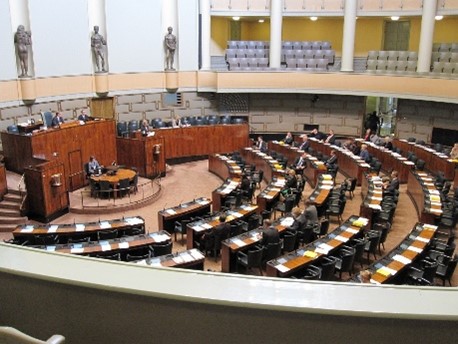Dear Colleagues,
Welcome to the very first Walker update of 2024! This time of the year often gets a bad reputation as the dullest part of the year, however it is also filled with the sparks of new endeavours. In honour of this the Walker Institute team brings you glimpses of exciting things coming this year as well as a reflection on last year’s highlights.
MCRILG -“My Climate Risk Interdisciplinary Learning Group”
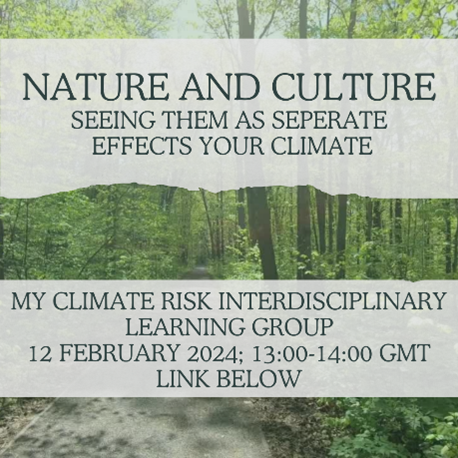 The iconic monthly reading group known as MCRIRG has been renamed to the “My climate risk Interdisciplinary Learning Group”. This change comes to highlight the focus on collaboration between disciplines and the opportunity learn from each other.
The iconic monthly reading group known as MCRIRG has been renamed to the “My climate risk Interdisciplinary Learning Group”. This change comes to highlight the focus on collaboration between disciplines and the opportunity learn from each other.
Next session will be on 12 February 2024; 13:00-14:00 GMT and is titled:
“Reviewing the relationship between neoliberal societies and nature: implications of the industrialized dominant social paradigm for a sustainable future “ Read more
New Course Alert!
This year will see the introduction of a brand-new course to the Walker Academy
Starting in 2024, we are introducing a new course ‘Engaging with Decision Makers’ which will be drawing on the Walker Institute’s work in the UK and international policy arena, focusing on natural hazards and applied ecology. Find out more here
New Colleagues
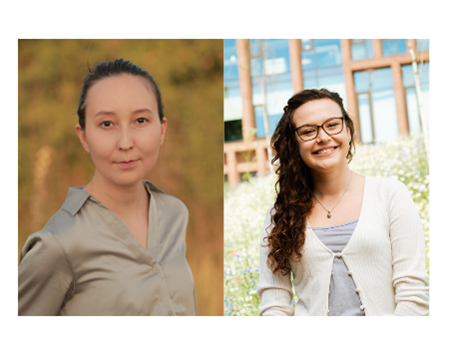 Lynn De Miranda has joined our Team from the Food BioSystems DTP as a Communications intern. She met Walker through the COPCAS program, and is excited to help curate the institute’s digital media and weave in her film-making talent. View one of Lynn ‘s video here
Lynn De Miranda has joined our Team from the Food BioSystems DTP as a Communications intern. She met Walker through the COPCAS program, and is excited to help curate the institute’s digital media and weave in her film-making talent. View one of Lynn ‘s video here
We are also delighted to welcome Zarina Saidaliyeva who is interning with us from SAGES as a Research Assistant. She will be working on our portfolio of climate risk and adaptation research in the Middle East and South Asia, and CHAIRR Malawi, linking climate risks to emergent diseases and livelihood impacts.
UNiPEG (UNFCCC Interdisciplinary Programme Engagement Group)
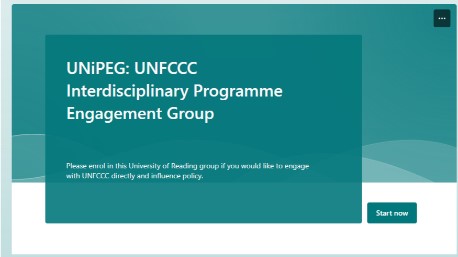 As part of our role in maintaining UoR ‘s COP Observer Status, we are extending the COP coordination group to include a focus on interdisciplinary research across the university that can feed directly into the UNFCCC Work Programmes. UNiPEG (UNFCCC Interdisciplinary Programme Engagement Group) will meet once a month to prepare for specific interventions points throughout the year, not just at COP! If you are interested and/or already engaged with the UNFCCC (or other UN work programmes), we would love to hear from you via this link.
As part of our role in maintaining UoR ‘s COP Observer Status, we are extending the COP coordination group to include a focus on interdisciplinary research across the university that can feed directly into the UNFCCC Work Programmes. UNiPEG (UNFCCC Interdisciplinary Programme Engagement Group) will meet once a month to prepare for specific interventions points throughout the year, not just at COP! If you are interested and/or already engaged with the UNFCCC (or other UN work programmes), we would love to hear from you via this link.
BEST HIGHLIGHTS FROM LAST YEAR
What really happened at COP28?
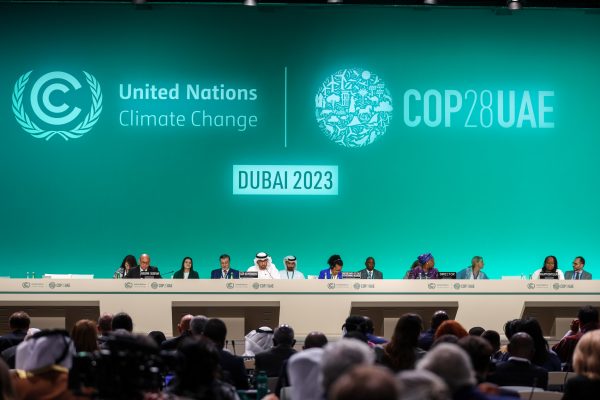
Photo by IISD/ENB | Mike Muzurakis | View of the dais during the plenary
The event showcased outputs produced by students, reflected on the role of the University at these climate conferences and provided a space for university wide discussions. Thanks to Fiona Spuler for taking the lead on hosting this event and everyone on who contributed to its success. Link to the session recording.
Later Is Too Late: Tipping the Balance from Negative to Positive Side Event
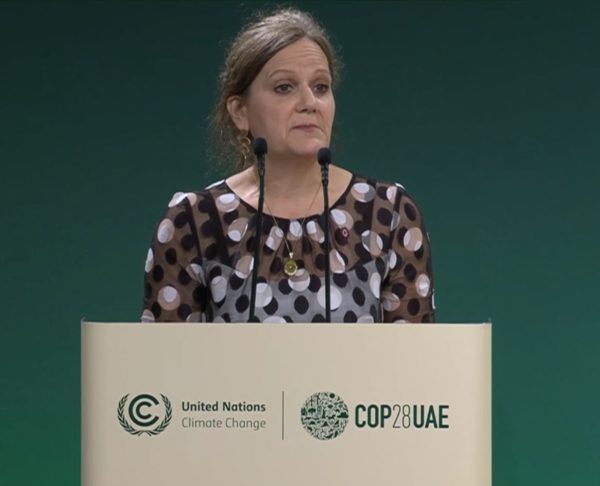 Professor Rosalind Cornforth spoke at the Later is Too Late side event at COP28, this event brought together scientists, political leaders, civil society and non-state actors to take stock of signals of progress and shine a light on the actions needed to tip the balance towards positive change. This event also saw the launch of the Global Tipping Points Report, the most comprehensive tipping point analysis ever produced. Find out more here.
Professor Rosalind Cornforth spoke at the Later is Too Late side event at COP28, this event brought together scientists, political leaders, civil society and non-state actors to take stock of signals of progress and shine a light on the actions needed to tip the balance towards positive change. This event also saw the launch of the Global Tipping Points Report, the most comprehensive tipping point analysis ever produced. Find out more here.
Click here to view the video recording of this event .
COP28 Climate Action Studio (COPCAS)
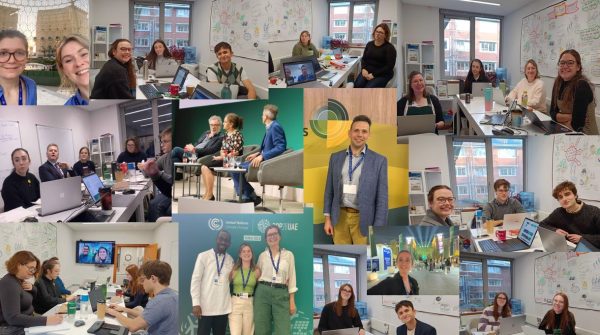 The December 2023 COP Climate Action Studio COP28 was very successful. Thanks to everyone who participated.. The video about our students engaging with COP28 is available here.
The December 2023 COP Climate Action Studio COP28 was very successful. Thanks to everyone who participated.. The video about our students engaging with COP28 is available here.
Publications
Adaptation Gap Report publication
The Walker Institute was pleased to have contributed to the Adaptation Gap Report by UNEP, featuring a case study on Transboundary Adaptation in the Middle East, providing valuable insights into climate change adaptation needs Read here.
ICECCAP
The publication “Using the Implementation Centric Evolving Climate Change Adaptation Process to Bridge the Gap between Policy and Action” in Frontiers in Climate highlights the ICECCAP methodology developed by the Walker Institute, emphasizing its role in national adaptation planning processes. Read more
Partnerships
The Sightsavers Climate Health in Africa Integrated Risk Research (CHAIRR) project, focussing on neglected tropical diseases (NTDs) and disability, Malawi was chosen as the initial country for the analysis of how climate change is affecting the reach and severity of a number of neglected tropical diseases. This work will lay the foundation for future climate health risk assessment work with Sightsavers, across the continent.
Foresight and Scenario Development for Anticipatory Adaptation in Hindu Kush
The Walker Institute’s Director, Prof. Rosalind Cornforth, delivered a talk for the ICIMOD Consultation Workshop in the Himalayan University Consortium on My Climate Risk: Integrated Climate, Livelihoods and Environment Storylines for Adaptation Planning. This initiative seeks to identify and analyse trajectories of critical risks under different climate scenarios and their implications for mountain economies and livelihoods. This supported stakeholders in preparing for anticipatory adaptation actions in development, planning, and transitioning to a sustainable mountain economy.
Community
Staff Well-Being
The Walker Institute has been fostering a holistic approach to well-being by organizing monthly sessions every month. These sessions have provided a creative and relaxing outlet for participants, incorporating various activities throughout last year. Staff engaged in diverse artistic pursuits such as painting, origami, glass etching, and card making, allowing them to explore their artistic side and unwind from their regular routines. Additionally, the sessions featured activities like meditation, providing a space for individuals to focus on mindfulness and stress reduction.
What happened across the world this week?
Please click on this link to access the Global Hazards Weekly Bulletin produced by Prof Virginia Murray and her team at PHE, and archived by Prof Richard Allan. It contains a weekly summary of global hazards.
All the best!
The Walker Institute Team

